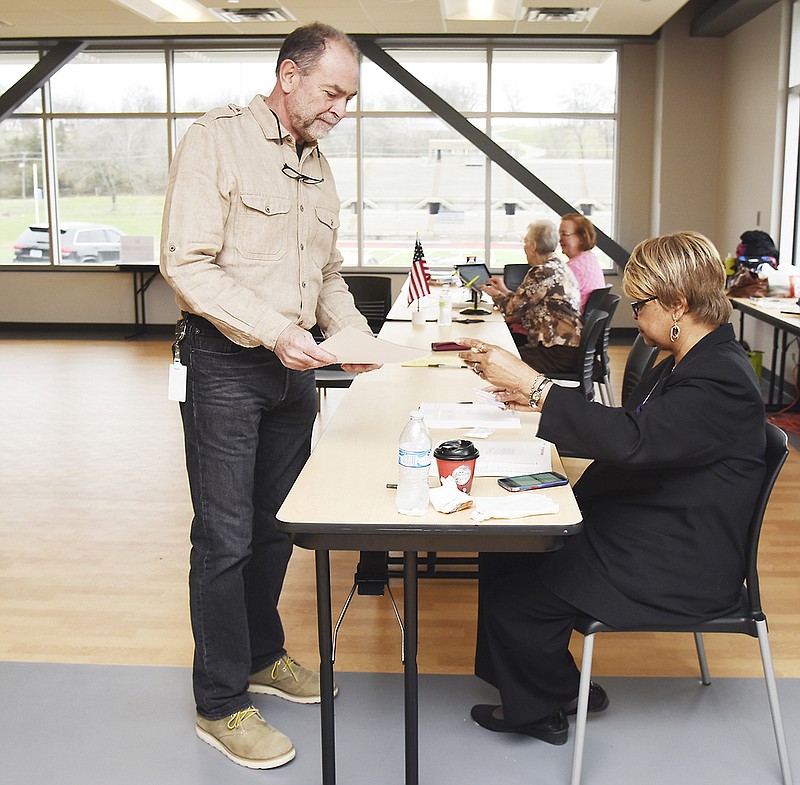Missouri government appears to have violated provisions of the National Voter Registration Act, a federal judge said Friday.
In a 13-page order, U.S. District Court Judge Brian Wimes granted part - but not all - of a preliminary injunction sought by the League of Women Voters of Missouri and the St. Louis and Kansas City chapters of the A. Philip Randolph Institute.
That injunction requires the state to change the Revenue Department's procedures for handling online, and mail, change-of-address forms so they also provide voter registration information.
Under its current procedures, the department provides that information only to people who make a change-of-address while appearing in-person at the licensing office.
In their lawsuit filed last April, the groups argued that policy violated the NVRA because the state didn't provide voter registration information with the mailed and online change-of-address forms, and Missouri Secretary of State Jay Ashcroft and Revenue Director Joel Walters had not done enough to make sure all voters who changed addresses through the department would have their voter registration information changed.
Wimes' order also requires the state to send a new mailing to every voter who has used the online or mail forms since Aug. 1, 2017 - including a voter registration form, and information about the voters' appropriate polling location.
"This temporary measure is intended as a stop-gap only," Wimes wrote. "The Court will determine whether the processes in place before Aug. 1, 2017, also violate the NVRA in the context of considering the merits of permanent relief."
Wimes explained his finding: "Under the plain language of Section 5(d) (of the NVRA law), voter registration should be provided in connection with '[a]ny change of address form.'"
He added, "If Congress intended to limit Section 5(d) only to residential address changes, that limiting language would appear in the statute.
"Instead, Section 5(d) refers to any change of address."
Wimes said his findings "are consistent with the NVRA's enumerated purposes of increasing the number of eligible citizens (for voting) and protecting the integrity of the electoral process."
And, quoting from a ruling in a federal case from Georgia, Times wrote: "It is evident that Congress' concern was to provide citizens eligible to register to vote with opportunities to register by utilizing state offices with which they were likely to have contact."
Naila Awan, a counsel at Demos - one of the legal firms representing the groups in the lawsuit - said Friday's ruling "sides with democracy and promotes a more robust and inclusive democracy. The state of Missouri has been failing to provide address update services required by the NVRA.
"This disproportionately impacts people of color and low-income individuals, who tend to move at higher rates."
In a news release, Davin Rosborough, a staff attorney in the ACLU's Voting Rights Project, added: "By requiring the state to immediately contact individuals who were not provided the required voter registration services when updating their address, (the) ruling will help ensure that fewer Missouri voters will be disenfranchised this November as a result of the state's failure to comply with the NVRA."
Under Missouri law, a voter's registration must show their current address.
A person who moves before the deadline to register to vote - but doesn't change their voter registration information - can't vote at any election until the registration information is updated.
The deadline for registering for the Nov. 6 election is Oct. 10.
In their lawsuit, Wimes noted, "Plaintiffs have also presented evidence that approximately 200,000 Missourians move between counties (and thus to new election jurisdictions) within the state every year, and the Defendants have demonstrated that approximately 40,000 Missourians have used the forms at issue here to update their license records since the November 2016 General Election."
Under the federal NVRA, whenever an individual updates, with the state motor vehicle agency, the address associated with their license or identification card, the state also must update the individual's voter registration - unless the individual specifically asks the state not to make that change.
However, the lawsuit said, Missouri residents never have been provided voter registration services, when conducting online or mail change-of-address transactions through the Revenue Department.
Denise Lieberman - co-director of the Power and Democracy Program at Advancement Project's national office and coordinator of the Missouri Voter Protection Coalition - said in the news release: "The Court recognized the harms of Missouri's failure to update voters' registrations when they move.
"(The) ruling will help ensure that voters who have moved are notified and have an opportunity to update their registrations to enable them to cast a ballot and have it counted in November."
Also, Kathleen Boswell, president of the League of Women Voters of Missouri, noted in the news release: "Year after year, Missouri voters are denied the right to vote because the voter registration rolls do not reflect their current address.
"Our own members have been denied voter registration services when trying to change their address online. (The) ruling will ensure that the state agencies know they need to do more to uphold their federal voter registration obligations."
Wimes scheduled a telephone conference call Wednesday morning for the lawyers to discuss their next steps in the case.

